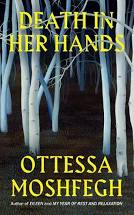One of my all-time favourite books is Eileen (shortlisted for the Man Booker Prize) by author Ottessa Moshfegh, who also wrote the popular My Year of Rest and Relaxation. Her new novel, Death in Her Hands (Jonathan Cape Penguin Random House 2020) is another intimate study of a possibly unreliable narrator, with sinister and unsettling overtones threading through an ostensibly fairly ordinary story.
In this psychological thriller / suspense, our protagonist Vesta – a widow in her early seventies who has moved to an isolated cabin in the woods, with her faithful dog, Charlie – seems every bit the quiet, contained, sensible, harmless ‘old lady’. She spends her days relishing her aloneness, adoring her dog, taking walks in the woods, coaxing her garden, eating, sleeping and generally living a banal existence. The setting and place is portrayed particularly well.
Early in the novel, on one of her daily walks, she comes across a handwritten note pinned to the ground with four small black stones. The note says: Her name was Magda. Nobody will ever know who killed her. It wasn’t me. Here is her dead body.’
The note shakes her to the core – there is no evidence of a dead body anywhere that she can see, and anyway who would leave such a note in the woods, declaring their innocence, but also announcing that nobody would ever know about the circumstances of Magda’s death? And so Vesta begins an internal stream-of-consciousness monologue, and an external investigation, to try to uncover the truth. Who was Magda? Who wrote the note? When? (It wasn’t there the previous day). Why? (What is the point of it?) Where is the body? As her imagination runs wild, Vesta becomes obsessed with Magda and all the people she supposes are (or were) a part of her life – family, friends, suspects. Her theories begin to take shape, and when she notices subtle menacing behaviour or suspicious acts, her obsession possesses her, with the reader – and Vesta herself – unable to distinguish truth from nightmare, fantasy from fact. Is there an innocent explanation or is there more to Vesta than we at first believe?
This novel is haunting and ghostly. The author takes us deep into the mind and psyche of Vesta so that we almost become her: embracing her daily routine, harbouring her insecurities and doubts, imagining her constructed realities, assuming – as she does – meaning where perhaps there is none.
This is the perfect example of a narrative where nothing much happens but even so, the minutiae seem laden with hidden resonance. And as we are propelled further along into Vesta’s mind, we begin to doubt our own assessment of her character, her history and her reliability.

